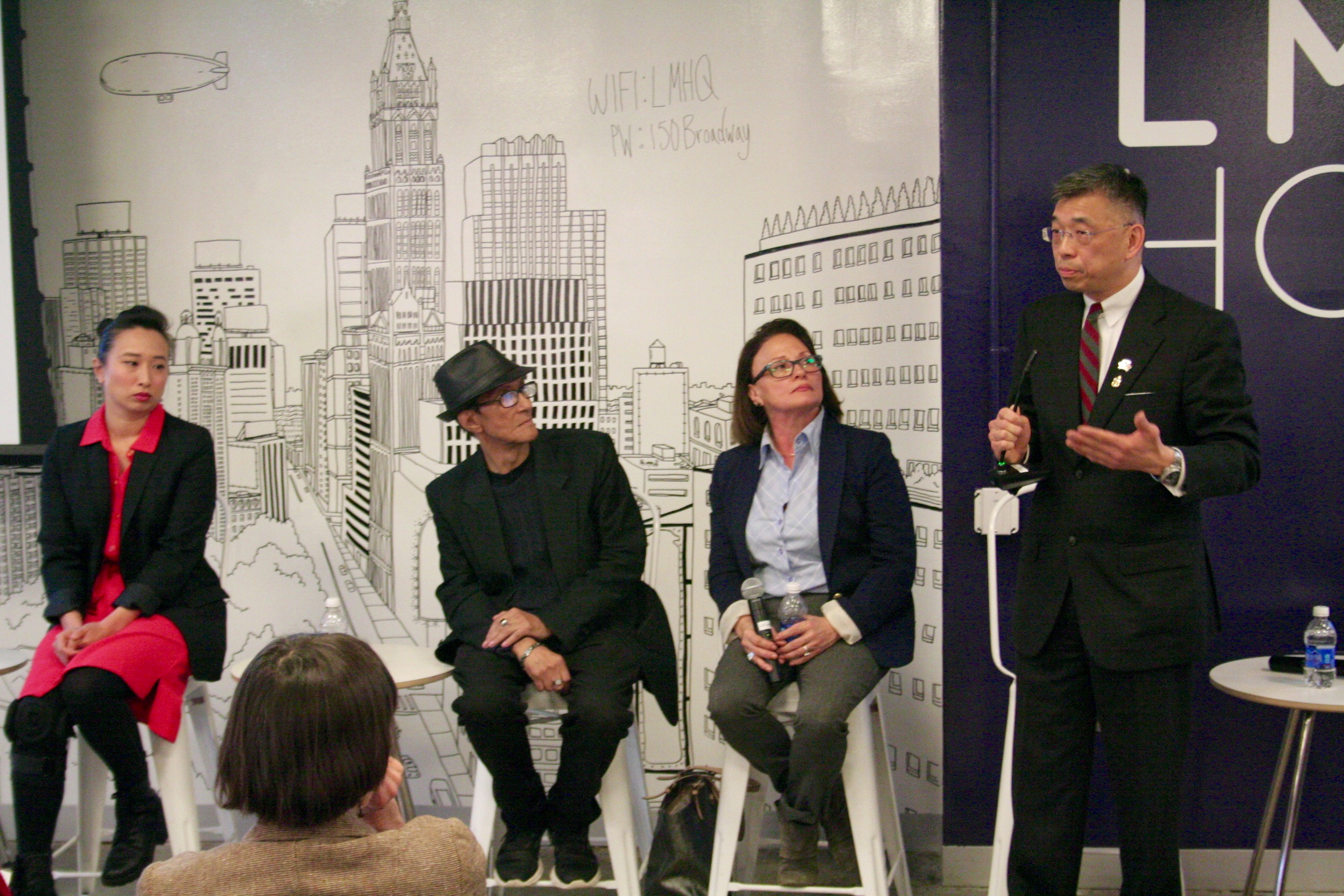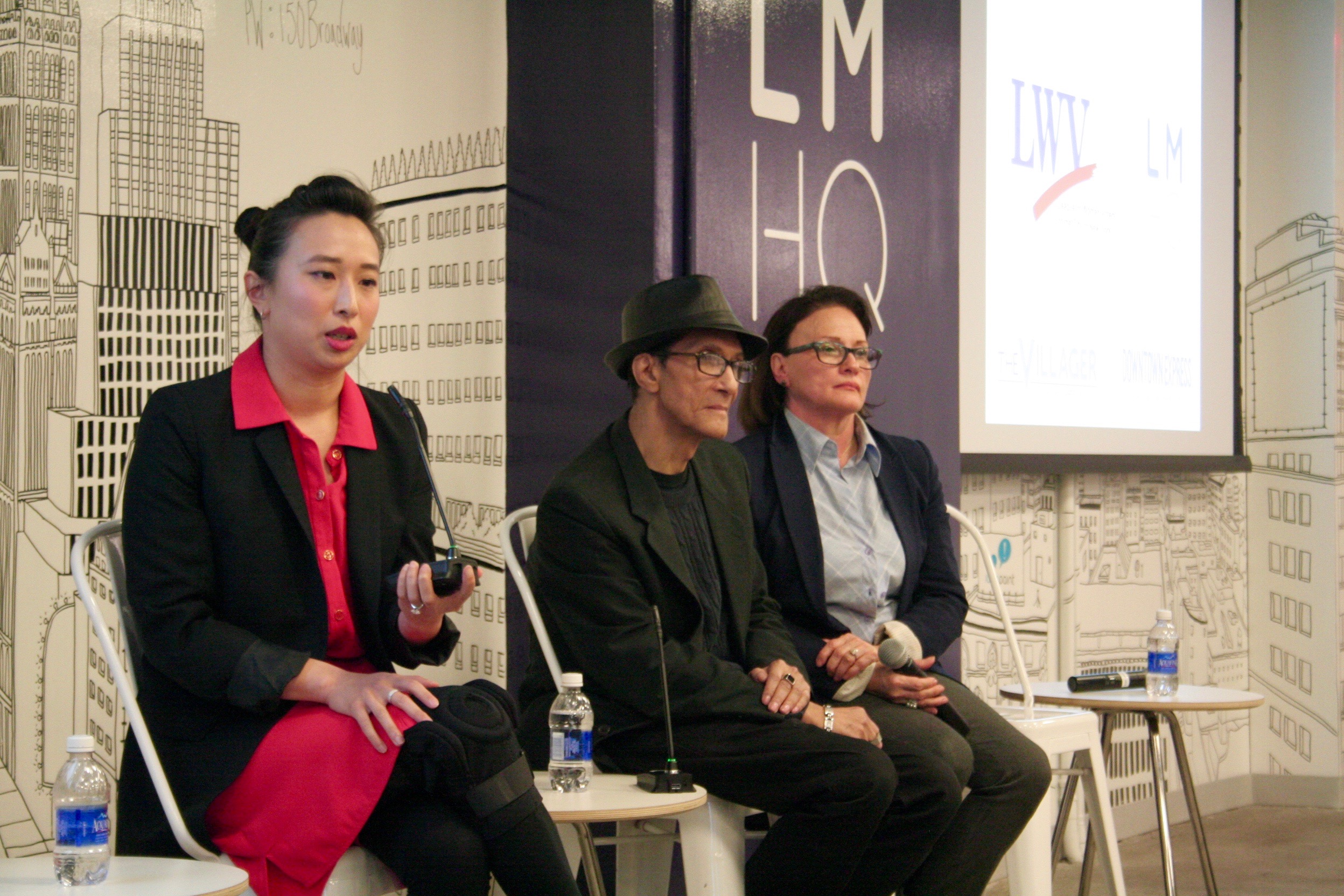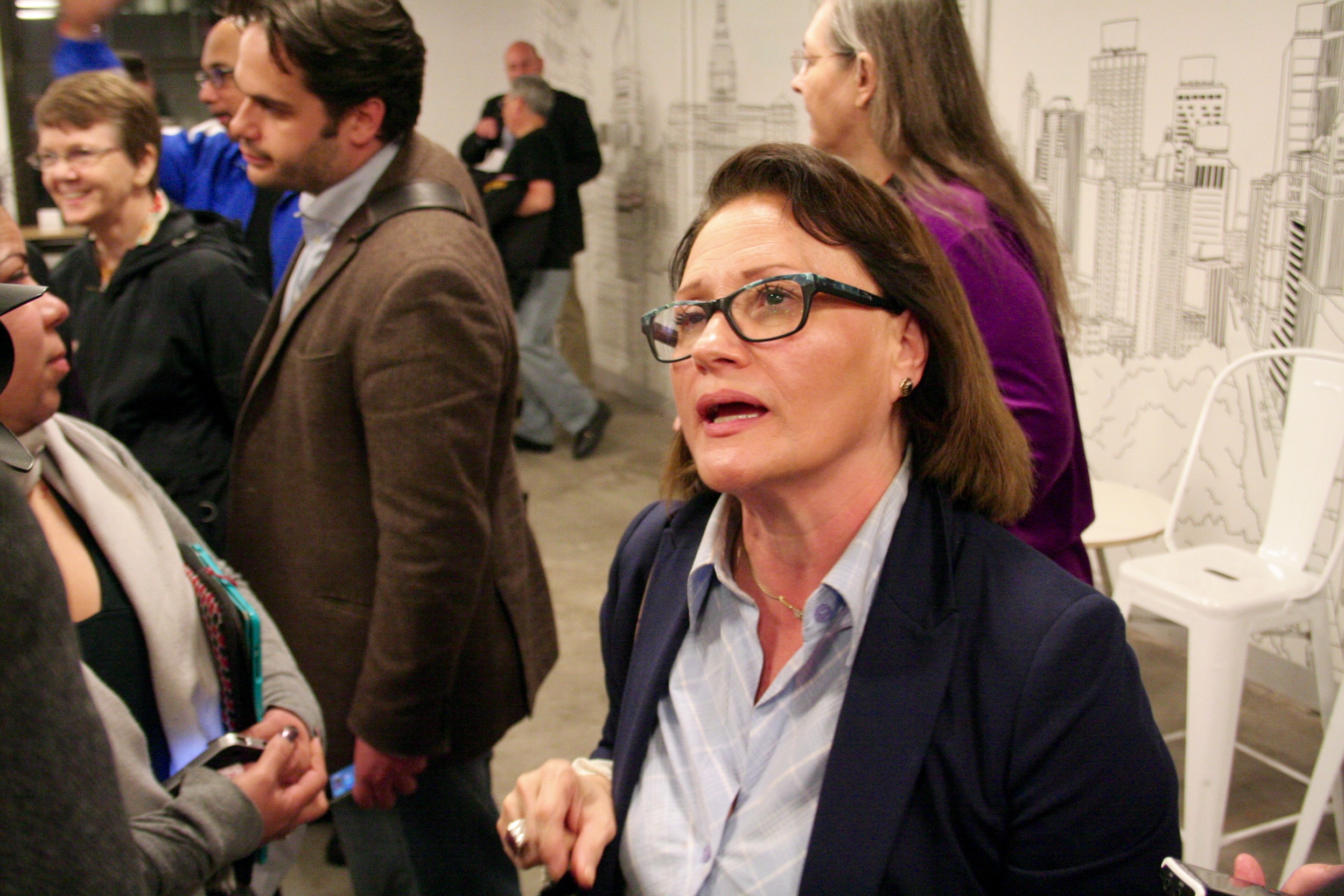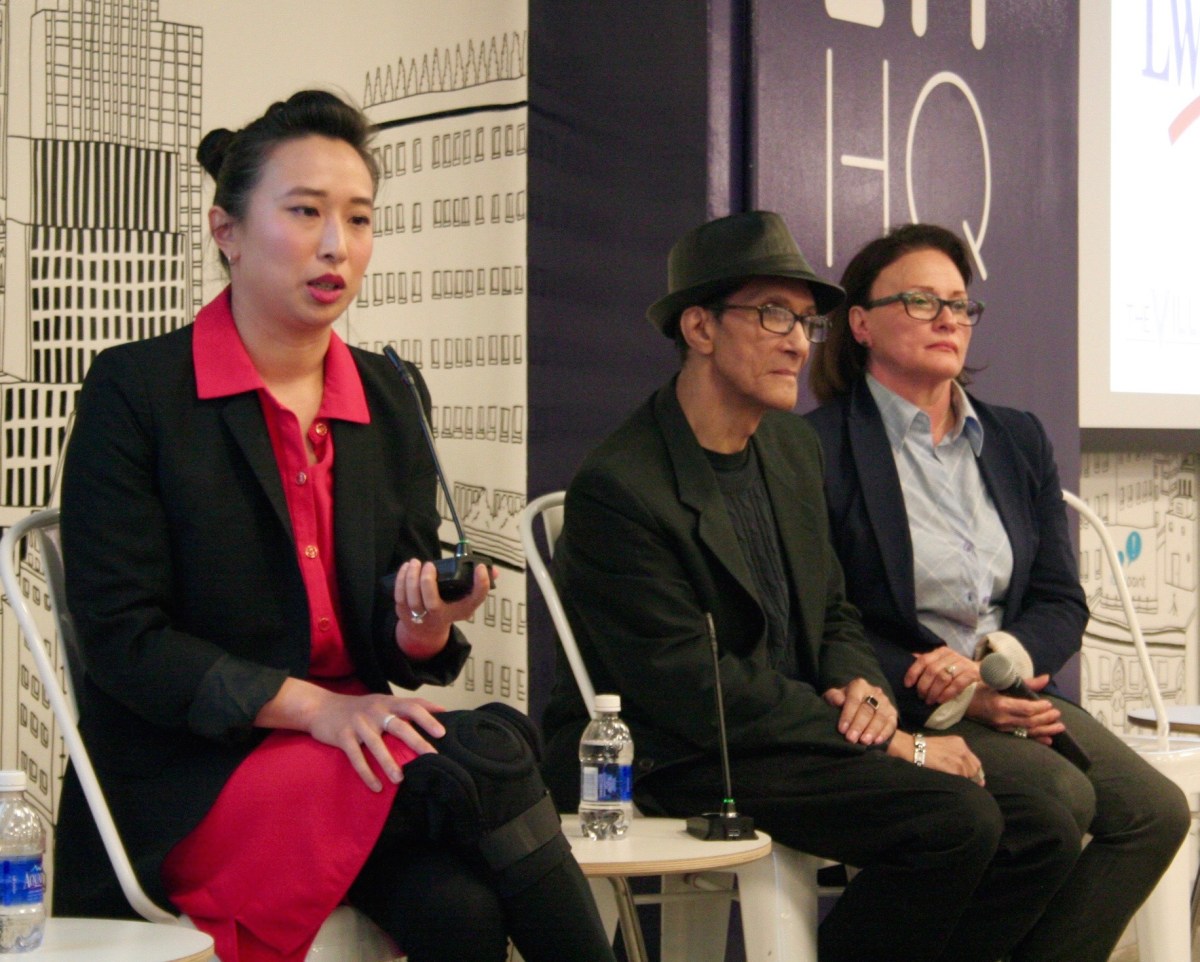
BY YANNIC RACK | Four candidates vying to fill the seat of former state Assembly Speaker Sheldon Silver presented their platforms in a public forum last week, providing a thorough look at each of their priorities ahead of the special election this month for Lower Manhattan’s 65th Assembly District.
The discussion, organized by The Villager and the League of Women Voters of New York, gave the contenders a chance to make their case for why they are best suited to fill the seat recently vacated by Silver after the longtime representative was convicted on corruption charges last year.
Facing off were Alice Cancel, the Democratic nominee selected by a closed County Committee vote; Yuh-Line Niou, a Democrat running on the Working Families Party line; Dennis Levy, the Green Party candidate running on a marijuana-legalization platform; and Lester Chang, the Republican candidate, who will also be on the April 19 ballot on three other lines besides the G.O.P. — the Reform, Independence and Clean Up the Mess party lines, the latter which he created for this election.
The winner of the special election will take office in May, but will have to fight to keep the seat come September, when an expected packed field of candidates will run in the Democratic primary election.
The Assembly district includes Lower Manhattan, Chinatown, Little Italy and the Lower East Side, and also stretches up into Soho and a small part of the East Village.
Topics at the event, which was held at the Downtown Alliance’s LMHQ space at 150 Broadway and was moderated by Villager Editor in Chief Lincoln Anderson and Laura Altschuler, the L.W.V.’s special projects coordinator, ranged from charter schools and admissions tests for specialized high schools to nuclear power and affordable housing.
But Silver, a Democrat who represented Lower Manhattan in Albany for four decades, also loomed large, with all candidates evoking him to drive home a key point — how they would prioritize working to “clean up” the state Legislature if elected in two weeks.
“Most people right now want change, they want reform, they want to make sure that we can move forward,” said Niou, who is currently chief of staff for Queens Assemblymember Ron Kim and lives in the Financial District.

“People are too comfortable up there,” agreed Cancel, a Democratic district leader for more than 20 years. She previously worked for Silver, as well former state Senator Martin Connor, and currently works for City Comptroller Scott Stringer as a community liaison.
“My vision for going to Albany is actual reform,” Cancel stated.
Niou emphasized that Governor Andrew Cuomo’s budget once again ignored the topic of ethics reform and, like her fellow candidates, she invoked measures like campaign finance reform and instituting term limits for politicians.
“We’re at ground zero of corruption down here,” she said. “Term limits are only one tool in the tool box [to fight it].”
“We need some type of ethics reform, we’re in a crisis in New York State,” agreed Levy, an H.I.V.-positive grandfather whose main issue is marijuana legalization. “We really need to do serious housecleaning in Albany.”
Chang, who agreed to attend the debate at the last minute but had to leave about halfway through, said he was the only one seriously committed to bringing about change — as evident in the name of his party.
“If everybody votes for ‘Clean up the Mess,’ that gives us a direct mission,” said Chang, who works in global logistics and is a Navy veteran. “We have to create a critical mass.”
However, while the other candidates made sure to distinguish themselves from the powerful Assembly speaker as much as possible, Cancel actually had kind words for Silver when asked about his legacy.
“He was a hero in our community,” she said defiantly, remembering how Silver worked to remove the Bibby Resolution, a temporary prison barge, from its dock in the East River by Montgomery St. in the early 1990s. “We worked together to get that removed,” she said.
Among the other candidates, the sentiment evoked little sympathy.
“To me, [Silver] represents everything that’s wrong with Albany,” said Levy, to a big round of applause. “He was a wheeler and dealer. I would use him as a template for what not to do.”
But later, when asked about the Essex Crossing development currently being built in the Seward Park Urban Renewal Area (SPURA), Cancel went the other way and said that she fought against Silver, who has been accused of delaying the mega-project for decades.
“I myself, with community leaders like Margarita Lopez and Rosie Mendez, at the time said to Shelly, ‘These are people that are being displaced,’ ” she said. “So if you think of me as a Shelly puppet — we fought because I was against the fact that this was not being developed for the people that had lived there for 40-plus years.”
On the subject of education, Chang stood out as an ardent supporter of charter schools, which Levy also supports to a limited degree.
“Each charter school has its own unique characteristics,” Chang said. “And that choice is what parents want.”

Everyone agreed that the city’s public schools need a serious overhaul, and Levy also advocated for moving control of them from the mayor to local districts.
“I think we can turn around the public schools by bringing control to the community,” he said. “We know best what our kids need.”
Asked about her position on admissions tests for the city’s eight specialized high schools, Cancel said the current system was “working” but that there was room for improvement, while Niou questioned today’s overall testing culture — which Chang vigorously defended.
“Repetition is the mother of learning,” he said. “You have to learn the basics first, so just put more resources at the bottom.”
Members of the Chinese press could be seen furiously taking notes on Chang’s remarks on the admissions tests, and a Niou supporter later confirmed that this a very important subject in the Asian community.
On the topic of affordable housing, each candidate (save for Chang, who at this point had left for a prior appointment) brought up different points. Cancel called for repealing the Urstadt Law that she said has brought a “shadow over the community.” Niou advocated for strengthening rent laws and union labor for local construction projects. Levy said that he would impose a “moratorium on luxury buildings” if elected — though he did not specify how he would bring that about.
A contentious topic for Cancel and Niou was the Democratic County Committee, whose members had overwhelmingly backed Cancel with their vote in February.
Calling the nominating process “flawed,” Niou had dramatically dropped out of the race at the last minute, a move that was thought to be strategic but which she herself framed as a protest.
She reiterated her position at last week’s debate, and emphasized that the four local Democratic clubs that rule the process also came to power under Silver’s tenure.
“I would definitely look into changing the current special election system,” she said.
“I went through the process to take a look at it,” she said, “and I decided that it wasn’t a democratic process. I spoke up against it and used my time at the committee as a platform to talk about the process.”
Cancel called the committee a “sleeping giant,” saying that it is called on in circumstances like this, when a candidate is convicted of a felony or dies in office. She implied that if she was chosen through a flawed process, then so was Scott Stringer — who has endorsed Niou — when he was elected to the Assembly in 1993 after winning the Democratic nomination for a special election.
“These people were elected by the community,” she said of County Committee members. “It’s a democratic process.”
All three remaining candidates also said they support shutting down the accident-plagued Indian Point nuclear plant, which has come under increased scrutiny in light of recent failures and forced shutdowns. In addition, environmentalists fear that a proposed gas pipeline that would run next to the plant could leak and lead to a shutdown — or worse — at the reactor.
“Shut it down immediately,” Levy said of the power plant. “Let’s look at clean energy sources instead.”
Asked what kind of development they would support at 5 World Trade Center, the tower project currently on standby at the W.T.C. site, Niou and Cancel mentioned schools — to alleviate the chronic school overcrowding in Lower Manhattan — while Levy emphasized that local residents should be trained for and employed in the building’s construction.
On the subject of restoring the commuter tax for Manhattan, everyone agreed it was a good idea to ease congestion and raise additional funds for local projects — though co-moderator Altschuler had to chime in and clarify that a commuter tax would only apply to out-of-town drivers, after Cancel said she would only support it with an exemption for Manhattanites.
The candidates had the chance to focus in on their personal issues when asked by co-moderator Anderson what they would introduce as their first three bills in the Assembly, should they be elected come April 19.
Cancel named “affordable housing,” “schools” and “senior developments” as things she would want to bring to her district.
Levy said there wouldn’t be a need to introduce new legislation, because there are already plenty of good laws that just need better enforcement. He also declared that he would work to legalize marijuana.
“Quite frankly, people don’t realize that if we legalize marijuana in this state it will mean thousands of jobs,” Levy stressed. “It’s a $50-million-to-$100-million industry that we can bring to New York,” he said. He also mentioned the need for creating more open space in the district.
Niou, who emphasized her experience in drafting bills in Albany as Kim’s right-arm person, offered three specific proposals: eliminating credit history scores in awarding car insurance, and increasing financial literacy and asset-building programs.
She also couldn’t resist taking a swipe at Cancel for her attempt at coming up with a list.
“When you’re talking about housing and education — those are issues and committee titles, those are not particular bills or legislation,” she said.
After answering two questions from the audience — about using tax money for religious schools and creating an adoptee rights bill in the state Legislature — the candidates had a chance to drive home their positions during their closing statements.
All of them, once again, put heavy emphasis on creating change after the tumultuous end to Silver’s long reign.
“It is time now to do some things, to make some changes in our state,” Levy said. “And change doesn’t start from the top to the bottom, it starts from the bottom to the top. So here I am, at the bottom. If you send me to Albany, I’ll make some real change,” he said.
“To be able to change the system, you really need to know how it works,” Niou said, invoking her immigrant roots and her career in public service.
“This is what drives me every day,” she said. “I want to make sure we have a voice and that our government is accessible to us.”
Cancel said she has been an advocate for her community for more than 40 years and knows the issues and concerns of the district.
“I feel that I can bring that experience to Albany, along with the voices that are here today,” she said.



































